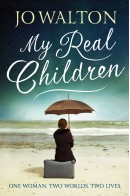was asking about Tolkien’s allegory of WWII in the foreward to LOTR when he says what would have happened in Middle Earth if it had followed the course of WWII:
The real war does not resemble the legendary war in its process or its conclusion. If it had inspired or directed the development of the legend, then certainly the Ring would have been seized and used against Sauron; he would not have been annihilated but enslaved, and Barad-dur would not have been destroyed but occupied. Saruman, failing to get possession of the Ring, would in the confusion and treacheries of the time have found in Mordor the missing links in his own researches into Ring-lore, and before long he would have made a Great Ring of his own with which to challenge the self-styled Ruler of Middle-earth. In that conflict both sides would have held hobbits in hatred and contempt: they would not long have survived even as slaves.
J.R.R. Tolkien, Foreward to The Lord of the Rings.
I think there was this very specific British thing about WWII that in order to win it we had to give up class privilege — the equivalent for the US would have been if in order to win they’d had to introduce civil rights and a fair minimum wage and federally funded equal education to first degree level and a free health system. I mean that’s pretty much exactly what happened, during WWII in Britain. And all this was a good thing, but for the people who were privileged it was percieved as a terrible loss of all sorts of good things which they didn’t necessarily define as privilege — because you can’t live the kind of life people lived without an underclass, at least not at that tech level.
So you get people like Nevil Shute and Mary Renault fleeing Britain for Australia and South Africa where they could, at least for a while, hope to lead a 1930s style middle-class life, and you get the huge explosion of novels about cosy catastrophes that conveniently kill off the working classes (in The Day of the Triffids the seeing hero is literally chained to blind working class people who can’t survive. I don’t think Wyndham intended this as a metaphor, but…) and Tolkien felt as if the light had gone out of everything good and beautiful and what was left was no doubt more democratic but much more lacking in magic.
I don’t think he meant “Ring as Bomb”, it was the Ring of Power, always, and I think he meant is as power — in his allegory in order to beat Mordor, Hitler, we allied with Saruman, Stalin, and the US, who I think he saw as another kind of Saruman — the US made some very odd demands on Britain during WWII — and became as bad as the enemy.
Now things didn’t turn out with Stalin or the US learning from the ruins of Berlin how to do those things themselves — largely because Stalin already knew and the US leadership were at that point I think fundamentally decent and democratic and had no imagination of themselves, then, as power-grabbing, and also their class structure had not in fact been as shaken by the war. (Civil rights movements started in the fifties though. It had been shaken, but not as much.) So the US instead of looting conquered Europe introduced the Marshall Plan — and that was the thing nobody was expecting, not Tolkien, not Orwell, nobody, there’s never been anything like it before or really since (if you consider MacArthur’s Japan part of it) and by two generations after WWII in Britain nobody was sad about lost privilege because they didn’t expect it, and the majority of people were much happier and better off anyway, and the tech level had advanced so that life was easier for everyone even without servants.
Tolkien died when I was six years old, so he lived to see that, but only just.


